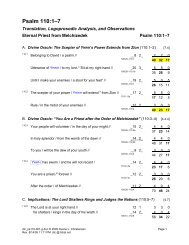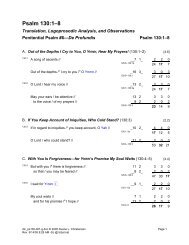Reading Genesis 1-2 in Hebrew - Bibal.Net
Reading Genesis 1-2 in Hebrew - Bibal.Net
Reading Genesis 1-2 in Hebrew - Bibal.Net
Create successful ePaper yourself
Turn your PDF publications into a flip-book with our unique Google optimized e-Paper software.
<strong>Read<strong>in</strong>g</strong> <strong>Genesis</strong> 1–2 <strong>in</strong> <strong>Hebrew</strong><br />
����������������„������������������������œ�������������‹<br />
����•���2:2� �����������û������„��������‘��ƒ������������������œ����������œ•����<br />
����������������„������������������������œ�������������‹<br />
����•��—transliteration: way-kaµl 'È-lO-hÓµm Bay-yYYÙµm<br />
haH-H¸-bÓ-vÓµ m¸-la'k-TÙµ '·-Heµr vA-WAµh, “and Elohim f<strong>in</strong>ished <strong>in</strong> the seventh day his work which he<br />
made.” The open<strong>in</strong>g verb is Piel shortened imperfect 3 rd sg. masc. with wau-conversive from the<br />
root hlk (“be complete, at an end”) with Elohim as subject. The masc. noun £Ùy (“day”) has the<br />
preposition b (“<strong>in</strong>”) as its prefix, <strong>in</strong> which the vowel takes that of the def<strong>in</strong>ite article it displaces.<br />
The seventh (yivyibL¸Hah) day is different from the six “work<strong>in</strong>g days” of <strong>Genesis</strong> 1. The fem. noun<br />
hAk'Al¸m (“work”) refers to what G-d did or made (hAWAv). The fact that it is f<strong>in</strong>ished “<strong>in</strong> the seventh<br />
day” suggests an added dimension to G-d’s creation that moves beyond the sequence of events<br />
<strong>in</strong> <strong>Genesis</strong> 1. G-d’s purpose <strong>in</strong> creation is on-go<strong>in</strong>g.<br />
A case can be made, however, to emend the text with the Samaritan Pentateuch, LXX and<br />
Syriac to read the “sixth” day here on the basis of the logoprosodic analysis. The three<br />
successive dyads here scan 23 || 27 || 25 morae <strong>in</strong> the MT. Emend<strong>in</strong>g haHH¸bÓvÓ (“seventh”) to<br />
read haHHiHÓ (“sixth”) improves the balance to scan 23 || 25 || 25 morae (see p. 58, n. 2:2 h<br />
below).<br />
In a symbolic sense, Jonah was <strong>in</strong>vited to participate <strong>in</strong> G-d’s creation by lett<strong>in</strong>g go of his anger,<br />
which had become a “great evil” that would destroy him (see <strong>Read<strong>in</strong>g</strong> Jonah <strong>in</strong> <strong>Hebrew</strong>).<br />
Potentially all time that follows the six “work<strong>in</strong>g days” constitutes G-d’s “seventh day” of<br />
Creation—the ideal “Shabbat.”<br />
���������������œ����������œ•�—transliteration:<br />
way-yiH-BOµt Bay-yÙµm haH-H¸-bÓ-vÓµ, “and he ceased <strong>in</strong> the<br />
seventh day.” The verb here is Qal imperfect 3 rd sg. masc. from the root tbH (“cease, desist,<br />
rest”). The <strong>Hebrew</strong> word tA–baH (“Sabbath”), which does not appear here, is derived from this root.<br />
����������û<br />
������„��������‘��ƒ��—transliteration: miK-Kol-m¸-la'k-TÙµ '·-Heµr vA-WAµh, “from all his work<br />
that he had done.” For the most part this is a repetition of words that appear earlier <strong>in</strong> this verse.<br />
The preposition §im (“from”) is prefixed to the lOk (“all”) and assimilation of the n˚n, which<br />
expla<strong>in</strong>s the doubl<strong>in</strong>g of the follow<strong>in</strong>g letter. The vowel is shortened because of the maqqEp that<br />
connects the two words here.<br />
�������„ ������•����<br />
��������������‘����������������‹<br />
© 2005 BIBAL Corporation, All Rights Reserved Version 1.0<br />
22<br />
����•��� 2:3 �<br />
�����������‘��ƒ�����������‹�����ƒ���<br />
������������������„ �������û����‘��������<br />
����������������‘����������������‹<br />
����•��—transliteration: way-bAµ-rek 'È-lO-hÓµm 'et-yÙµm haH-H¸-bÓ-vÓµ, “and<br />
Elohim blessed the seventh day.” The verb here is Piel imperfect 3 rd sg. masc from the root ¢rb





